|
|
|
Sort Order |
|
|
|
Items / Page
|
|
|
|
|
|
|
| Srl | Item |
| 1 |
ID:
104554
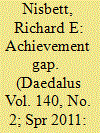

|
|
|
| 2 |
ID:
104552
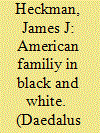

|
|
|
| 3 |
ID:
128548
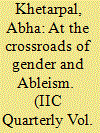

|
|
|
| 4 |
ID:
102605
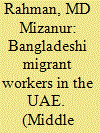

|
|
|
|
|
| Publication |
2011.
|
| Summary/Abstract |
This article examines the migration experiences of women and men under conditions of temporary migration. It has been amply shown that gender is relevant to most aspects of migration. However, despite the fundamental increase in research on gender and migration, a transnational space, where gender matters but which has not bee so thoroughly explored to date, is the experiences of women and men migrants in the migration process, especially under conditions of labour migration in the Gulf States. Focusing on Bangladeshi male and female migrant workers in the UAE, this research sheds light on gender-differentiated patterns of demographic profiles, recruitment and pre-departure costs, working and living experiences, wages, savings, and remittances, health care and leisure activities and reports substantial variation in migration experiences across gender lines.
|
|
|
|
|
|
|
|
|
|
|
|
|
|
|
|
| 5 |
ID:
106662
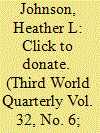

|
|
|
|
|
| Publication |
2011.
|
| Summary/Abstract |
This article investigates the role of visual representation through images in the international refugee regime, with a particular focus on the female refugee. I argue that visual representation illustrated by the photo archives of the unhcr in particular, but also in other institutional sources, plays a crucial role in shaping our imaginations and knowledges, and that its dynamics are important in understanding the politics of asylum. As the international refugee regime institutionalised by the unhcr has developed, the imagination of the refugee has undergone three concurrent shifts: racialisation, victimisation and feminisation. Each of these shifts has contributed to changing policies and practices in the regime, particularly the change in 'preferred solution' from integration to repatriation or, where possible, prevention. More importantly, these shifts have all operated within a discourse of depoliticisation of the refugee, denying the figure of the refugee the capacity for political agency. This depoliticisation works through the construction of the 'female' refugee, indicating important lessons for our understandings of the political agency of both women and non-citizens.
|
|
|
|
|
|
|
|
|
|
|
|
|
|
|
|
| 6 |
ID:
112371
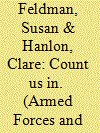

|
|
|
|
|
| Publication |
2012.
|
| Summary/Abstract |
This article reports the findings of a qualitative study that explores the linkages between female veterans' experiences in warlike, peacemaking, peacekeeping, and humanitarian operations and their perceived health support needs over the long term. It is based on the experiences of Australian female veterans who had deployed overseas. The findings suggest that a woman's emotional well-being over the long term and ability to fully reintegrate back into civilian life after deployment is diminished when there is a significant disparity between her expectations of deployment and her actual operational experiences. A major implication from these findings is that civilian health and support services should develop a better understanding of the distinctive needs of the female veteran population and develop stronger linkages with the military community so as to facilitate ongoing deployment-related support for female veterans.
|
|
|
|
|
|
|
|
|
|
|
|
|
|
|
|
| 7 |
ID:
168341
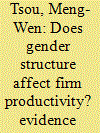

|
|
|
|
|
| Summary/Abstract |
This study examines the impact of gender workforce composition on firm productivity. Using a large sample of Chinese manufacturing firms and conditional on human capital-related controls, we find that firms with a greater share of female workers demonstrate lower productivity. However, our results suggest that increasing the fraction of highly educated female workers significantly improves firm performance. This effect is evident for all private firms regardless of their trade orientation and foreign firms undertaking purely domestic sales. However, the effect does not exist in the case of state-owned and export-oriented foreign enterprises. Compared with medium-sized and large firms, small firms benefit more from gender diversity at high education level. Finally, the share of highly talented female workers indicates better firm performance in more feminized industries.
|
|
|
|
|
|
|
|
|
|
|
|
|
|
|
|
| 8 |
ID:
121632
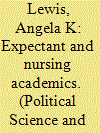

|
|
|
|
|
| Publication |
2013.
|
| Summary/Abstract |
The challenges that women in academia face are well documented. However, there is a dearth of research on the experiences of female academics particularly on job interviews as expectant or nursing mothers. This study sought to document the experiences of these women. Considering the grueling nature of the academic job interview, do expectant or nursing mothers ask for accommodations on the interview, and if so, how do departments respond to their request? We find that women refrain from job interviews as expectant mothers while others suggest using the "hidden pregnancy phenomenon." Nursing mothers had more positive experiences, although experiences were less than desirable. Based on the findings, we offer a list of recommendations to departments to help improve this critical step in starting a career in academe.
|
|
|
|
|
|
|
|
|
|
|
|
|
|
|
|
| 9 |
ID:
087570
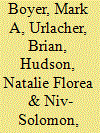

|
|
|
|
|
| Publication |
2009.
|
| Summary/Abstract |
Increasingly, scholars have taken note of the tendency for women to conceptualize issues such as security, peace, war, and the use of military force in different ways than their male counterparts. These divergent conceptualizations in turn affect the way women interact with the world around them and make decisions. Moreover, research across a variety of fields suggests that providing women a greater voice in international negotiations may bring a fresh outlook to dispute resolution. Using experimental data collected by the GlobalEd Project, this article provides substantial support for hypotheses positing that females generate significantly different processes and outcomes in a negotiation context. These findings occur both in terms of female negotiation behavior and the impact of females as negotiation facilitators/mediators.
|
|
|
|
|
|
|
|
|
|
|
|
|
|
|
|
| 10 |
ID:
132101
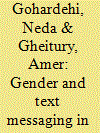

|
|
|
|
|
| Publication |
2014.
|
| Summary/Abstract |
Focusing on four linguistic domains, purpose/manner of communication, preferring local dialects, politeness, and volume of use, this study aims to explore how gender is reflected in messages produced by Iranian female and male students. A corpus of 2,116 text messages was analyzed. Participants also filled out a questionnaire on how frequently they used text messaging. Results indicated females to be more prolific users of messaging. As far as function is concerned, while texts produced by females were for the most part relational, involving an emotional language, males frequently employed messages for informative-transactional functions which were less wordy and in more authoritative language. In addition, males were more likely than females to employ their local dialect and forms considered less polite.
|
|
|
|
|
|
|
|
|
|
|
|
|
|
|
|
| 11 |
ID:
099787
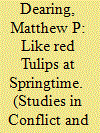

|
|
|
|
|
| Publication |
2010.
|
| Summary/Abstract |
In an era where female suicide terrorism is on the rise in conflict regions such as the Middle East, the North Caucasus, and South Asia, why has Afghanistan been largely immune to this trend? Why do some violent groups use female suicide terrorism and others avoid it? This is a critical question for policy makers and analysts attempting to understand a dangerous terrorist phenomenon and how it may evolve in Afghanistan. During the anti-Soviet jihad, narratives were woven of men and women marching through the mountains of Nuristan to "offer their blood for the Islamic revolution like red tulips at springtime." But today, women are wholly absent from the Taliban and their jihad in Afghanistan. This article analyzes, in particular, the absence of women in Taliban martyrdom operations. There are three primary findings from this study that explain the low propensity for female suicide bombers in Afghanistan. First, a permissive social and geographic environment in Afghanistan gives insurgents freedom of mobility and a resistance capacity characterized by a reduced necessity for female suicide bombers; second, the capacity of a fiercely conservative culture restricts female participation in both Afghan society and within insurgent organizations; and third, the pronounced absence of a female culture of martyrdom limits women from participation in insurgent actions and narratives.
|
|
|
|
|
|
|
|
|
|
|
|
|
|
|
|
| 12 |
ID:
092944
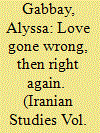

|
|
|
|
|
| Publication |
2009.
|
| Summary/Abstract |
This article examines male/female dynamics in three versions of the classical story of the Sassanian prince Bahr m G r and his lyre-playing slave girl: that of the Sh hn ma of Firdaws?, the Haft Paykar of Niz m? Ganjav?, and the Hasht Bihisht of Am?r Khusraw. It argues that each version provides progressively more positive depictions of intergender dynamics, ones that are contingent upon more egalitarian understandings of the male/female dichotomy. The later authors destabilize the categories of "male" and "female," equalizing and even uniting the dichotomous pairs, so that men and women draw nearer to each other in qualities rather than remaining in their usual polarized positions. In the Hasht Bihisht, moreover, we witness a reversal of hierarchies in which traditionally feminine qualities receive preference over masculine virtues-an act that suggests fresh possibilities for harmonious interactions between the sexes.
|
|
|
|
|
|
|
|
|
|
|
|
|
|
|
|
| 13 |
ID:
091665
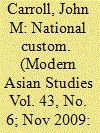

|
|
|
|
|
| Publication |
2009.
|
| Summary/Abstract |
This article frames the debate about mui-tsai (meizai, female bondservants) in late nineteenth-century Hong Kong within changing conceptions of the colony's political, geographical and cultural position. Whereas some colonial officials saw the mui-tsai system as a national shame that challenged Britain's commitment to ending slavery, others argued that it was an archaic custom that would eventually dissolve as China modernized. The debate also showed the rise of a class of Chinese elites who had accumulated enough power to defend the mui-tsai system as a time-honoured Chinese custom, even while acknowledging that in Hong Kong they lived beyond the boundaries of Chinese sovereignty. Challenging notions of the reach of the colonial state and showing how colonial policies often had unintended consequences, this debate also reveals the analytical and explanatory weakness of concepts such as 'colonial discourse' or 'the colonial mind'.
|
|
|
|
|
|
|
|
|
|
|
|
|
|
|
|
| 14 |
ID:
107860
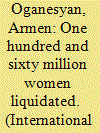

|
|
|
| 15 |
ID:
115075
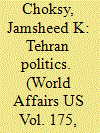

|
|
|
|
|
| Publication |
2012.
|
| Summary/Abstract |
You are not a wise man, you tyrant," raps the Iranian female singer Bahar. "Why do your clothes smell like blood??.?.?.?Why do you crush this cry for justice? The people don't deserve such disdain." Her chiding words against Supreme Leader Ayatollah Ali Khamenei go to the heart of the problem that the Islamic Republic faces: the growing illegitimacy of a cruel and inaccessible theocracy whose control over Iran might well be slipping.
|
|
|
|
|
|
|
|
|
|
|
|
|
|
|
|
| 16 |
ID:
092888
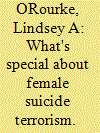

|
|
|
|
|
| Publication |
2009.
|
| Summary/Abstract |
This study analyzes the interaction between the motivations of individual attackers and terrorist group strategies. To do so, I combine a quantitative analysis of all known suicide terrorist attacks between 1981 and July 2008 with a strategic account of why terrorist organizations employ female suicide terrorism (fst) and case studies of individual female attackers. I advance five central claims. First, I reveal the superior effectiveness of fst from the perspective of the groups that employ women. Second, I explain that terrorist groups increasingly enlist women as suicide attackers because of their higher effectiveness. Third, I demonstrate that terrorist groups adapt their discourse, catering to the specific individual motives of potential female suicide attackers in order to recruit them. Fourth, I show that female attackers are driven by the same general motives and circumstances that drive men. Furthermore, and in contrast to the existing literature, women attackers uphold, rather than eschew, their societies' norms for gender behavior. Attempts to transform these societies into gender-neutral polities are therefore destined to increase fst. Finally, I conclude that, unless target states adapt their defensive strategies, we should expect an increase in fst.
|
|
|
|
|
|
|
|
|
|
|
|
|
|
|
|
| 17 |
ID:
115871
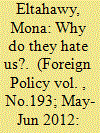

|
|
|
| 18 |
ID:
179865
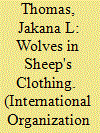

|
|
|
|
|
| Summary/Abstract |
Although a substantial body of research argues that women provide terrorist organizations with important tactical benefits, few studies draw out the implications of this argument or examine whether female recruits affect the outcomes of terrorist operations. Using data on individual suicide attacks from 1985 to 2015, I show that an attacker's gender influences the lethality of an attack. However, this effect is conditional upon the gender norms of the state in which the attack occurs. The results demonstrate that a female advantage is more apparent only in societies where a woman's role in public life is limited; attacks by female suicide attackers are more deadly in countries where women are largely absent from the workforce, civil society, and protest organizations. I also assess whether counterterrorists eventually adapt to the use of female suicide terrorists. The results demonstrate that female attack lethality is declining with time, suggesting that security forces eventually adapt to women's participation in terrorism. These findings are consequential because they highlight the effect of persistent gender biases on counterterrorism efforts.
|
|
|
|
|
|
|
|
|
|
|
|
|
|
|
|
| 19 |
ID:
104684
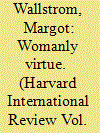

|
|
|
| 20 |
ID:
118790
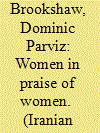

|
|
|
|
|
| Publication |
2013.
|
| Summary/Abstract |
This study examines the poetry of two women of nineteenth-century Iran-one royal, one non-royal-and the women patrons for whom they composed praise poetry. Through the reconstruction of female-centered patronage networks and associated female-only performance venues, and via an examination of the active roles played by female patrons both in affairs of state and in the management of the immense royal harem, this study highlights the various ways in which members of several generations of women in Qajar Iran were involved in the production, dissemination and appreciation of poetry. It is argued here that these patronage and poetry production networks should be read as evidence of a female-centered literary tradition, one that was in dialogue with (and often intersected) the dominant male tradition; one that empowered the women actors within it to create a sisterhood of poets through which their art could be passed on from mother to daughter, and from daughter to granddaughter (and occasionally from mother to son).
|
|
|
|
|
|
|
|
|
|
|
|
|
|
|
|
|
|
|
|
|